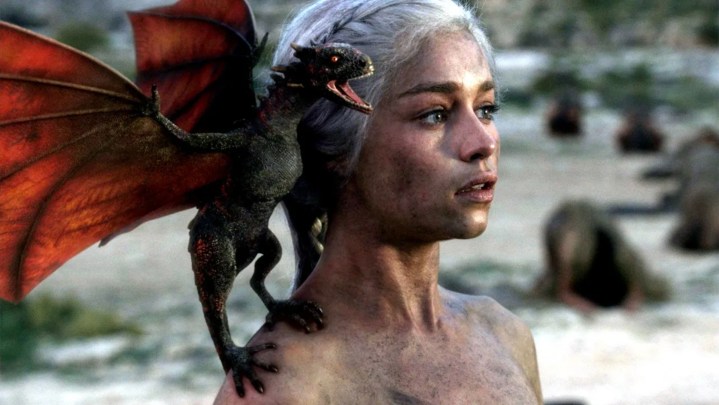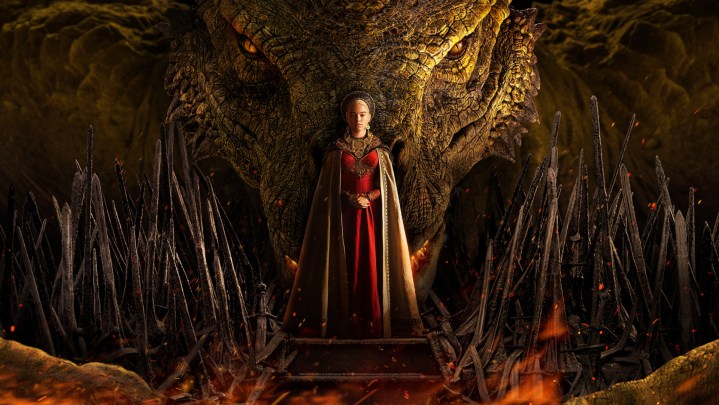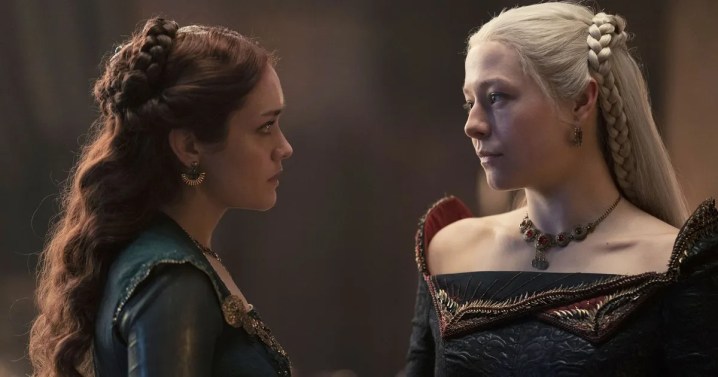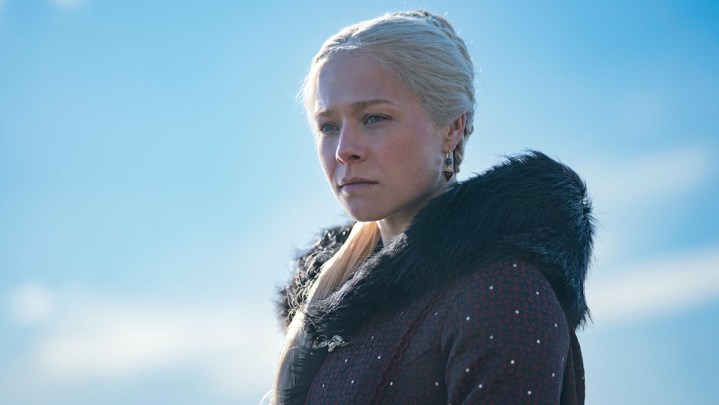May 19, 2019, is a date branded on the pop culture lexicon. The finale to Game of Thrones, the television phenomenon that single-handedly revitalized the fantasy genre and redefined what “event television” meant, aired to the collective disappointment of millions of fans. The show’s decline in quality had begun in season 7, with some questionable choices happening as far back as season 5, but the train wreck that was season 8 was beyond words. Consistency went out the window in favor of spectacle, resulting in a rushed season that reduced the world’s greatest TV show into a sad shadow of its former self.
The controversial finale put a seemingly permanent stain on Game of Thrones. In the years leading up to its conclusion, HBO expressed interest in creating a franchise based around George R. R. Martin’s World of Ice and Fire. However, the episode’s terrible reception put the network’s plan in doubt, with many wondering if the Game of Thrones brand was in a healthy enough place to support a franchise. Things got worse when the first spinoff, starring Naomi Watts, got unceremoniously axed — even after shooting a $30 million pilot — spelling doom for the would-be franchise. Alas, not all was lost; GoT still had an ace up its sleeve, and it was called House Targaryen.
Mother of Dragons

Let’s start with the obvious: Daenerys Targaryen was Game of Thrones‘ undeniable star. The perfect combination of relatable and inspiring, Daenerys was the perfect hero audiences could root for, the easiest character to like and support. Dany had the traditional hero’s journey, rising above her initial situation and becoming a near messianic figure.
Dany was Thrones‘ ultimate champion — unlike Tyrion, she had actual power; unlike Jon, she wasn’t afraid to use it. Daenerys represented the best of Game of Thrones; she was strong, willfull, imperfect, and captivating, an inspiring but ruthless character who had everything necessary to take the Iron Throne.
Above all, Daenerys had dragons. I cannot stress how important the dragons were to Game of Thrones‘ success. These mighty beasts are crucial to any fantasy story — all the best have at least one memorable dragon, from Smaug to Saphira. Dragons embody the fantasy genre, representing the power and enchanting nature of these fascinating and reality-defying worlds. Political intrigue made Game of Thrones, but dragons elevated it to the apex of pop culture.
The outrage for GoT‘s ending mainly focused on Daenerys’ fate, which many fans considered character assassination. Dany was always a fierce and ruthless young woman, but she was never cruel or stupid; her actions during the show’s penultimate episode, The Bells, were both. And while no one can deny she had shown signs of the infamous Targaryen madness, Daenerys was never the Mad Queen in the making.
GoT needed more time and patience to make her descent into tyranny work; instead, it settled for cheap shortcuts, fridging Missandei and turning Tyrion into a failure. However, the show’s most egregious crime was nerfing the dragons, turning them from powerful weapons to flying plot devices. By undermining the dragons, the show ultimately undermined itself.
Be a dragon

If dragons built Game of Thrones, dragons would also save it. HBO knew the show messed up the Targaryen storyline, ruining Daenerys’ legacy and casting a shadow on its reputation. Thus, if D&D killed the Targaryens, HBO would resurrect them. A spin-off centered on the Targaryens should be a no-brainer. The house of the dragon has a rich story in the source material, with Martin spending considerable time expanding it in recent years. But choosing the Dance of the Dragons as the main focus for the spinoff was a clear and blatant indication that HBO understood GoT‘s mistakes and wasn’t planning on repeating them.
More than political conflict, which it has, and fascinating characters, which it also has, the Dance of Dragons has precisely that: dragons. A ton of them. The Dance has dragons up the wazoo, to the point where many fans doubted it would ever receive an adaptation because of how pricey it would be. We’re talking about epic, full-scale dragon battles that will make the loot train attack seem like child’s play.
Game of Thrones waited years before Dany rode a dragon and even more before she used her children in battle. House of the Dragon wastes no time introducing its dragons, but its antidote to GoT‘s restraint is not excess. Season 1 serves as the prelude for the Dance, setting the stage and the main players but saving the best for later. Still, the show provided enough hints of what was to come for fans to trust it could pull off the Dance’s most important battles.
The last seconds of the season’s finale, “The Black Queen,” were all we needed to believe in House of the Dragon‘s power. The four-minute scene was a genre-blending triumph, a masterclass in execution. And if the show could do this much with a relatively simple scene, the possibilities for the more fearsome dragon battles down the line were endless. The Battle at Rook’s Rest, the storming of the Dragonpit, and above all, the Battle above the God’s Eye are all promises that House of the Dragon made; judging from what they already delivered, there’s no reason to doubt them.
The dragon queen

At its core, the Dance of the Dragons is a story about female rage. Sure, it has an abundance of men — this is Westeros, after all — but the source of the conflict, the power behind it, is made of two women. And after the Daenerys debacle, HBO needed a powerful female character to drive the franchise’s future. In the Dance of the Dragons, it found two.
Rhaenyra and Alicent are intriguing, if somewhat one-dimensional, characters on the page. Martin remains as engaging a storyteller as ever, but the sheer scope of Fire & Blood prevents him from fully exploring the intricate inner workings of any of its characters; the book is about the game, not the players. Thus, Rhaenyra and Alicent exist as ideas rather than fully-fledged characters, which fits the “history retold” angle that Fire & Blood adopts. Still, this approach prevents them from being as fascinating as Daenerys was.
House of the Dragon changed that. By placing Rhaenyra and Alicent front and center, the show turned them into developed figures full of agency and layers. Whereas the book presents them as bitter enemies arguing over petty things — literally, the source of their conflict is often reduced to each wanting to be “the first lady of the realm” — the show portrays them as friends-turned-rivals with conflicting feelings for each other. House of the Dragon makes several changes to their basic storylines, mainly turning them into more sympathetic figures than their book counterparts. But how could it not when its predecessor so mistreated its female characters?

GoT had a problem with its women. The show used excessive sexual violence to prove its point, putting women through hell and back before “allowing” them to earn their victory. But House of the Dragon actively rejects this approach. Rhaenyra is free to pursue her sexual desires and make her own choices, enjoying a freedom previous female characters in the franchise did not share. And although she spends most of the season dealing with the repercussions of said choices, that comes with the liberty to make them. More importantly, the show never condemns her and instead shows remarkable and constant empathy toward her, thus allowing us to see and appreciate her strengths and flaws.
For her part, Alicent receives a genuine and compelling motive for her actions beyond jealousy and power lust. GoT never shied away from portraying sympathetic antagonists, crafting some of the most engaging villains in modern television, and Alicent lives up to that legacy. Even if the show encourages us to stand against her, her journey, coupled with Olivia Cooke’s vulnerable performance, makes Alicent one of the best characters in House of the Dragon. Television needs more complex antiheroines that dismantle the generic “strong female character” trope; Alicent and Rhaenyra live up to this task, picking up where Daenerys left off and carrying her spiritual legacy. In many ways, they are avenging the Mother of Dragons.
Reign of the dragon

In the end, House of the Dragon‘s greatest triumph was its ability to give fans something they no longer had: hope. Whereas we used to look down at the idea of GoT spin-offs — why want more of something that already spat on our faces — we are now enthusiastic about the idea of more Westerosi content. Before, it was a full-me-once situation, but things are different now; we have faith again. House of the Dragon celebrated the World of Ice and Fire and Daenerys Targaryen. It represents all the best parts of the franchise without any of the ugliness of GoT season 8.
Above all, House of the Dragon opened a door that Game of Thrones accidentally closed, inviting us to demand more stories, Targaryen or otherwise. A Sea Snake spin-off? Of course! A show about Princess Nymeria? Why the hell not? A Jon Snow sequel? Sure, I guess. And what about the Dunk and Egg stories? That’s supposed to happen eventually; bring it on! Hell, resuscitate the Bloodmoon spin-off; there is a demand for that.
House of the Dragon made Westeros appealing again. It reminded us of the power and complexity of Martin’s world and cemented HBO as the network for prestige TV. More importantly, it restored Game of Thrones‘s fractured legacy. No longer is “The Iron Throne” the hated finale to one of the all-time best television shows, but a bad chapter in an ongoing story. Not a period, but a semicolon. And frankly, television is all the better because of it.
You can stream all of Game of Thrones and season one of House of the Dragon on HBO Max.
Editors' Recommendations
- HBO drops 2 dueling trailers for House of the Dragon season 2
- House of the Dragon season 2: Everything we know so far
- New Max streaming service combines HBO Max and Discovery on May 23
- Creature Commandos: Who are these DC heroes James Gunn will bring to HBO Max?
- Star Wars’ distant past has potential for Game of Thrones-like drama




